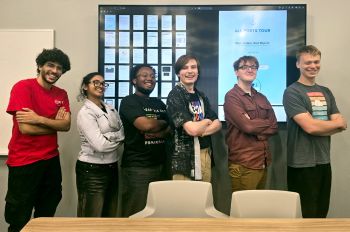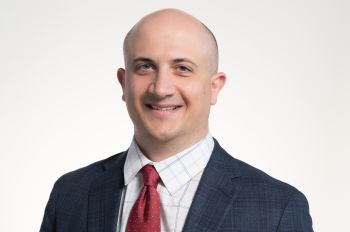Maurice Dawson Completes Fulbright Sponsored Cybersecurity Seminar Abroad

Maurice Dawson, assistant professor of information technology and management at Illinois Institute of Technology, recently wrapped up a two-week seminar in cybersecurity at AAB College in Pristina, Kosovo, through his fifth award from the United States Fulbright Scholar program that is granted by the U.S. Department of State.
Along with teaching AAB College students about cybersecurity issues, Dawson says he was able to develop meaningful connections and relationships that will benefit students at Illinois Tech through a new study away program in Kosovo, a Rochester Institute of Technology (RIT) Kosovo faculty member visit to Illinois Tech, and connecting with officials at KOS-CERT—Kosovo’s national Computer Incident Response Team.
“The experience was enlightening as I learned about the region, its historical importance, and their concerns and how Illinois Tech can assist,” Dawson says. “My expertise of this particular area has increased as a result of this experience. Civil wars, dictatorships, and political turmoil have all occurred in the Balkans. The panorama of human migration and technological adoption is, however, altering dramatically in nations from Albania to Montenegro.”
Dawson says the introduction of visa-free travel in January 2024 could bring Kosovo enormous potential to deepen business connections with its Balkan neighbors through unrestricted travel. However, this new modification could alter the nature of cyber threats.
“In order for newly independent states to understand what to expect in terms of cybersecurity difficulties, including recognizing errors that could have catastrophic consequences, this would serve as an excellent case study,” Dawson says.
Dawson says his main goal was to raise students’ awareness, knowledge, and abilities for new cybersecurity threats through workshops and lectures. Objectives included addressing modern cybersecurity challenges, threats and attacks, and how cybersecurity policies and procedures protect against cyberattacks, as well as increasing internet safety and cybersecurity awareness. Topics covered included security foundations and fundamentals, network defense and security, threats and vulnerabilities, risk management, computer forensics, cryptography, and developing a career in cybersecurity.
Dawson says cybersecurity needs in Kosovo are not too different from those in other nations, specifically the need for trained cybersecurity specialists.
“Cybersecurity education is relatively new, so even developing that talent is an uphill battle,” Dawson says. “Coupled with low wages, retaining that talent will be an issue. Kosovo has to figure out how to build its cybersecurity capacity while retaining the necessary talent to maintain it. My goal is to continue relations and work with faculty to include government entities on paths forward to accomplish just this.”
Many of the students that Dawson spoke with at AAB College were highly motivated to enter the cybersecurity field, but were looking to move to other countries such as Germany, Switzerland, and the United Kingdom to pursue their careers because of the low wages offered in Kosovo.
“This made me consider how things are in the U.S., and how we would be faced with a similar issue if another country were to compete with us in terms of wages,” Dawson says. “This would drive away the necessary talent, which would be sufficient to produce massively disastrous issues on its own.”
Dawson is one of more than 400 U.S. citizens who share expertise with host institutions abroad
through the Fulbright Specialist Program each year. Recipients of Fulbright Specialist awards are
selected on the basis of academic and professional achievement, demonstration of leadership in their field, and their potential to foster long-term cooperation between institutions in the U.S. and abroad.
The Fulbright Program is the flagship international educational exchange program sponsored by the U.S. government and is designed to build lasting connections between the people of the U.S. and the people of other countries. The Fulbright Program is funded through an annual appropriation made by Congress to the U.S. Department of State. Participating governments and host institutions, corporations, and foundations around the world also provide direct and indirect support to the program, which operates in more than 160 countries worldwide.




